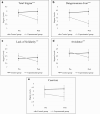Reducing Stigma Toward People with Serious Mental Illness Through a Virtual Reality Intervention: A Randomized Controlled Trial
- PMID: 37695822
- PMCID: PMC11693960
- DOI: 10.1089/g4h.2023.0118
Reducing Stigma Toward People with Serious Mental Illness Through a Virtual Reality Intervention: A Randomized Controlled Trial
Abstract
Background: Stigma toward people with serious mental illnesses (SMI), like schizophrenia, is a serious global public health challenge that limits the quality of life of those affected and poses a major barrier that keeps people from seeking professional help. There is an urgent need for novel, effective, and scalable interventions to decrease stigmatized perceptions of chronic psychotic disorders and to reduce the health burden imposed by them. Method: We conducted a randomized controlled trial to assess the impact of a new immersive virtual reality game (Inclúyete-VR) on the level of stigma toward people with SMI, measured by the Attribution questionnaire (AQ-27). Participants in the experimental group were exposed in an immersive way to hallucinations common in schizophrenia, then shown different psychosocial resources available for their recovery and social inclusion; those in the control group used VR software unrelated to mental health. VR sessions were delivered through Oculus headgear and lasted 25 minutes. Results: We randomly assigned 124 university students (55% female) to experimental or control conditions (n = 62 each). We used mixed ANOVA to compare outcomes before and after the intervention between the two groups. We found a significant intervention-by-time interaction (P < 0.001), with a reduction in the experimental group of overall stigma levels on the AQ-27 scale and its three subscales: dangerousness-fear, avoidance, and lack of solidarity (P < 0.001 for all). Conclusions: The Inclúyete-VR software proved effective in the short term in reducing stigma toward people with severe mental illness. The program's longer-term efficacy, scalability, and dissemination remain to be studied. ClinicalTrials.gov Identifier: NCT05393596.
Keywords: Mental illness; Serious games; Severe mental disorder; Stigma; Technology-based; Virtual reality.
Figures


References
Publication types
MeSH terms
Associated data
Grants and funding
LinkOut - more resources
Full Text Sources
Medical

